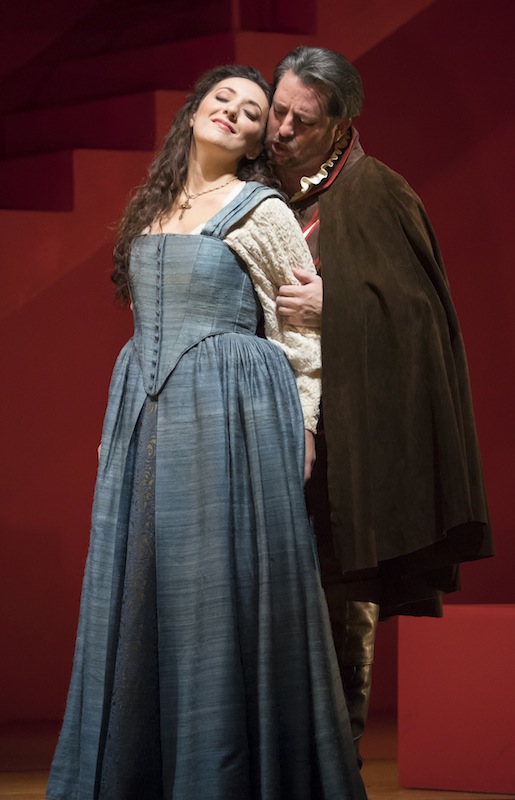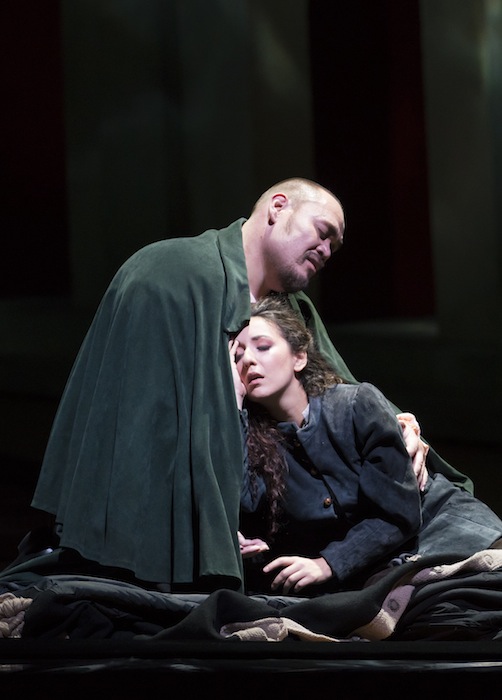Feola, Polenzani soar in Lyric Opera’s “Rigoletto”

The world of Giuseppe Verdi–Falstaff and Un giorno di regno apart–is not exactly a land of milk and honey. But even by the composer’s pessimistic standard, Rigoletto stands apart. Yes, the opera’s celebrated arias offer some of the most buoyant melodies Verdi ever wrote. But the tragedy of the hunchback court jester inhabits a bleak dystopian landscape where rape is sport, society is amoral to the point of nihilism, and the only innocent character dies a horrible death.
Lyric Opera of Chicago revived Verdi’s dark melodramma Saturday night. And while not all the musical elements were on the same inspirational level, two world-class performances lifted an otherwise routine Rigoletto far above the everyday.
Rosa Feola made a quite sensational company debut as Gilda, Rigoletto’s innocent daughter. The Italian soprano has appeared many times in Riccardo Muti’s programs with the Chicago Symphony Orchestra, most notably as a charming Nannetta in the 2016 concert performances of Verdi’s Falstaff.
But none of those events prepared one for the luminous vocalism and dramatic power of her doomed Gilda Saturday night. Feola’s youthful, quicksilver soprano is ideal for this role and her “Caro nome” had it all—tonal purity, fine flexibility and a gleaming high register with pinpoint accuracy in the cabaletta’s top notes. The duet “È il sol dell’anima” with Matthew Polenzani’s Duke was simply gorgeous, tenderly sung with nuanced expressive poise by both artists.
Her characterization of Rigoletto’s trusting daughter was just as remarkable. Feola completely embodied the role, conveying the girlish excitement of being in love with the Duke (masquerading as a poor student), her shame at her kidnapping and seduction, and despair at seeing the Duke’s moral vacuity firsthand (in the Quartet). The opera’s final scene rarely comes off as it should, but Feola made it devastating, with Gilda’s dying phrases softening and ebbing away as she tells her father that she will soon be reunited with her mother and watch over him in heaven. Rosa Feola’s Gilda was nothing less than a star-making performance.
Polenzani was just as inspired as the licentious Duke. Is there a finer lyric tenor currently singing anywhere before the public? Not likely. The Evanston native is at his artistic peak and from his hearty “Questo o quella” on, he sang with rich, vibrant tone and easy agility. A superb actor, Polenzani even managed to make the Duke less odious than usual, conveying a heartfelt–if fleeting–affection for Gilda in “Parmi veder le lagrime,” sung with golden tone and ardent lyricism. In his robustly cynical “La donna è mobile,” Polenzani threw off a note-perfect trill, timing it perfectly to plant a kiss on Maddalena with the final chord.
Unfortunately, Quinn Kelsey, a former Lyric Center young artist like Polenzani, was not in the same league. The Hawaii native has sung the role of Rigoletto in major international houses and has become Lyric Opera’s favored baritone in Italian repertoire—both of which point up the current dearth of great Verdi baritones more than anything else.
Kelsey’s burly voice is not a thing of beauty—a dry, middleweight baritone with little Italianate gleam or richness, straitened in range and narrow in color. He sang respectably and was clearly working hard Saturday in his portrayal of the embittered jester. Yet this workmanlike performance always seemed imposed from outside rather than coming from within, as with Feola’s Gilda or Polenzani’s Duke. His raging at the world’s injustice in Act 1 was lacking in fire and weight and Kelsey’s “Cortigiani” came off as merely angry and generalized–hardly the epic denunciation of the Mantua courtiers Verdi intended.
Kelsey’s finest moments were in his scenes with Feola’s Gilda, where he showed greater vocal sensitivity and more subtle acting. But this was hardly a Rigoletto performance for the ages–not even this baritone-deprived one.
Making his company debut as Sparafucile, Alexander Tsymbalyuk made a light-in-the loafers villain. The Ukrainian’s bass lacks the required black tone and subterranean depth for the role, and he brought little danger or menace to his portrayal of the for-hire assassin.
Repeating the role of Count Monterone from Lyric’s last Rigoletto four seasons ago, veteran Todd Thomas sounded strained and raw of tone with a less-than-earthshaking curse. Zanda Svede was a distractingly overplayed Maddalena, Lauren Decker a physically formidable Giovanna, and Takaoki Onishi a finely sung Marullo.
The new-to-Chicago production from San Francisco Opera offered a traditional staging that didn’t show much visual flair or imagination, but at least it didn’t reset the action in Trump Tower either. Michael Yeargan’s unit set depicts an open street with the ominously tilted facades nicely reflecting the off-center moral decay within the Mantua milieu. One wall rolls out to display the split-level interior of Rigoletto’s house–not bad on jester wages–though the bare, blood-red walls and utilitarian design suggest more an industrial fire escape. The same set, barely disguised, serves, less effectively, for Sparafucile’s inn in Act 4.
Apart from the unnecessary conceit of having Monterone’s daughter be an onstage presence–at one point sitting in Rigoletto’s lap–director E. Loren Meeker moved traffic efficiently and unobtrusively. Constance Hoffman’s period costumes proved effective and colorful, perhaps a bit too much with Rigoletto’s cornea-searing jester garb. Chris Maravich’s high-beam lighting brought little atmosphere to the table, with the bright visuals of Act 4 diluting the visual and musical impact of the storm and final scene.
Chicago audiences have gotten used to a certain level of Verdi conducting with Riccardo Muti at the helm of the CSO. And while Marco Armiliato’s capable musical direction got the job done, there was little tonal refinement, dynamic nuance or illumination coming from the pit. The power and dramatic intensity of this remarkable score were too often muted when not missing in action altogether. The Lyric Opera Chorus contributed their standard excellence under chorus master Michael Black.
Even with the production’s less inspired elements, Rosa Feola and Matthew Polenzani deliver enough brilliant vocal and theatrical firepower to make this a show worth catching.
Rigoletto runs through November 3. lyricopera.org.
Posted in Performances




Posted Oct 22, 2017 at 12:13 pm by Gray Felstiner
What a wonderful fresh drink of water this review and reviewer have
brought into my life.
A far-away former-Chicagoan subscriber, I came from California
for Rigoletto (and the amazing Orphee).
Your reviewer was at exactly the same production that I was.
Thank you!
Posted Nov 02, 2017 at 11:32 am by Peter DG
We were at the Mon 10/30 performance and found Kelsey’s performance quite acceptable, though granted not on a par with the two phenomenal lead super stars. His not-so-beautiful voice seemed to suit the role. My gripe is about the Maddalena – so the much anticipated quartet rated only three and a half.